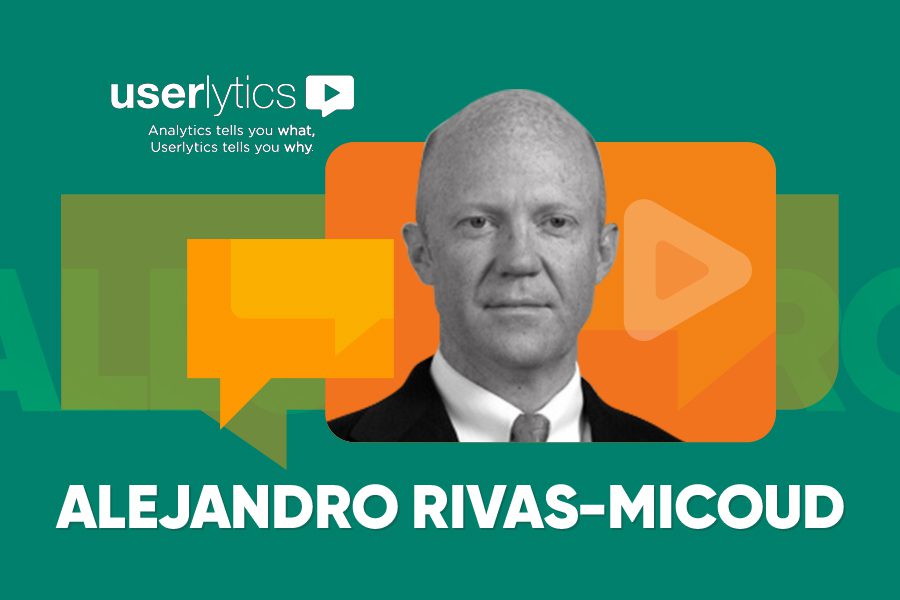Founder Stories: Alejandro Rivas-Micoud On Building Userlytics
In today’s Founder Story, we feature Alejandro Rivas-Micoud, Founder & CEO of Userlytics!
Read on for lessons he has learned from launching and marketing his business.

1. Please introduce your business and share your role.
Userlytics is one of the leading platforms offering user experience research and testing services, with enterprise clients in 39 countries, a global panel of test participants of over 2 million, and multi-lingual projects undertaken in over 7 countries.
In our view, user experience optimization is the most important lever a CEO can utilize to increase market share and profitability. There is a reason why Zoom dominates the market for peer to peer videoconferencing, despite being launched 9 years after Skype and 8 years after Gotomeeting; first mover advantage has no chance versus a better user experience, and Apple has known this for decades.
Leveraging Userlytics repeatedly and iteratively to identify UX pain points as well as uncover hidden customer and user aspirations is akin to brushing your teeth at least daily; you will avoid many painful visits to the dentist.
I founded Userlytics in 2009 and serve as its CEO, spending time in both our US Miami office and our European Madrid office.
2. What’s your backstory, what kind of challenges did you face, and how did you come up with your business idea?
I have been fortunately involved in many startups, as both founder and co-founder, including two national telecom operators in Europe, one fixed and one wireless, an audiotext company in Europe, a market research firm in Japan, a social media startup, marketing startup and UX testing startup in the US.
Of the above, some had great exits, some decent returns, and some no return but a high degree of learning and personal growth.
The idea for Userlytics, the latest venture, grew out of a failed social media launch, at which point the employees gathered together and brainstormed on what our next move should be, and we chose the then emerging field of remote usability and user experience testing.
3. How did you prepare for, and go about your launch?
Like many if not most startups, we went through a difficult phase while trying to determine who was our Ideal Customer Profile (ICP); we took it as a given that it would be developers interested in learning if the usability and UX of their work was good, or designers, for the same reason, or market researchers.
So we did prepare messaging and campaigns for all the above audiences, and also attended events geared towards them, but it was only when the C Suite, first of all in English speaking countries, realized how important UX was and started growing their internal UX Research teams that we finally found our product-market fit.
4. Since launching, what types of marketing campaigns and designs have worked best to attract and retain customers?
A mix of digital marketing (Adwords, Linkedin, other channels), Content Marketing (Webinars, Case Studies, Whitepapers, Blogposts etc) and industry events
5. What have been the most influential brands for your business? Whose branding and marketing do you aspire to and why?
I love the way Apple has built its brand over the years, not necessarily related to our business, but inspiring nonetheless.
6. What are your favorite marketing platforms/tools?
We use a variety of platforms, including Salesforce, Linkedin, Adwords and others.
7. Who or what inspires and motivates you?
I remember reading an article some years ago, where Warren Buffett was asked what he looks for when hiring. He said, “I look for two things: 1. Very smart people and 2. Very ethical people. Because the fastest way to bankrupt a business is to hire very smart but unethical people”
I have tried to apply that lesson in our own hiring practices, and I interview every single employee or contractor or freelancer we bring on board, to make sure they are a good fit for our corporate culture.
8. What are some lessons you’ve learned along the way that you would share with entrepreneurs hoping to launch or who have just launched?
As Peter Drucker said, “Culture east strategy for breakfast” We firmly believe that, and are constantly paying attention to how our culture grows as we incorporate new members of the team.
One of the aspects of our culture that we pay a lot of attention to is an emphasis on politeness; given that so much work is done remotely these days, through slack, email etc, it is easy to lose the context of what another person means or intends, thus leading to misunderstandings…
So we are always emphasizing the importance of being extremely polite, as one way to reduce such potential misunderstandings.
9. What do you believe are the qualities of a good entrepreneur? And what makes a team successful?
Someone who perseveres, and believes in himself or herself, in the face of skepticism from others (“If you can trust yourself when all men doubt you…” If, by Rudyard Kipling)
But, at the same time, be ready to acknowledge error, and thus flexibly and rapidly change tactics or even strategies when warranted (“…But make allowance for their doubting too…” If, by Rudyard Kipling)
Getting the right mix between perseverance and flexibility is an art, not a science, and is very difficult to get right.
A team is successful when all members understand that the decisions of a team, made consensually, overcoming disagreements, are always better than the smartest or most experienced member of that team.
10. Let us know where we can go to learn more!
- Website
- LinkedIn:
- YouTube:
- X:
- Instagram:
- Facebook:
